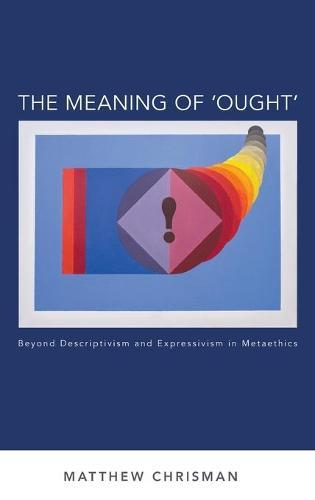Overview
The word 'ought' is one of the core normative terms, but it is also a modal word. In this book Matthew Chrisman develops a careful account of the semantics of 'ought' as a modal operator, and uses this to motivate a novel inferentialist account of why ought-sentences have the meaning that they have. This is a metanormative account that agrees with traditional descriptivist theories in metaethics that specifying the truth-conditions of normative sentences is a central part of the explanation of their meaning. But Chrisman argues that this leaves important metasemantic questions about what it is in virtue of which ought-sentences have the meanings that they have unanswered. His appeal to inferentialism aims to provide a viable anti-descriptivist but also anti-expressivist answer to these questions.""This is a remarkably bold and interesting book. Chrisman challenges nothing less than the entire conceptual framework within which most previous metaethics (and indeed, much other contemporary philosophy) has been done, and advances a very ambitious rethinking of the theoretical space. It's not only ambitious, but also extremely imaginative and smart, and Chrisman's scholarship is at a rare level, as he has assimilated a literature that is unusually broad both in terms of field and historical scope.""-Stephen Finlay, Professor of Philosophy, University of Southern California
Full Product Details
Author: Matthew Chrisman (Reader in Philosophy, Reader in Philosophy, University of Edinburgh)
Publisher: Oxford University Press Inc
Imprint: Oxford University Press Inc
Dimensions:
Width: 15.50cm
, Height: 2.30cm
, Length: 23.60cm
Weight: 0.499kg
ISBN: 9780199363001
ISBN 10: 0199363005
Pages: 280
Publication Date: 05 November 2015
Audience:
College/higher education
,
Undergraduate
,
Postgraduate, Research & Scholarly
Format: Hardback
Publisher's Status: Active
Availability: Manufactured on demand

We will order this item for you from a manufactured on demand supplier.
Reviews
This is a remarkably bold and interesting book. Chrisman challenges nothing less than the entire conceptual framework within which most previous metaethics (and indeed, much other contemporary philosophy) has been done, and advances a very ambitious rethinking of the theoretical space. It's not only ambitious, but also extremely imaginative and smart, and Chrisman's scholarship is at a rare level, as he has assimilated a literature that is unusually broad both in terms of field and historical scope. Stephen Finlay, Professor of Philosophy, University of Southern California
Matthew Chrisman has developed an innovative, sophisticated, and plausible set of views about the meaning of 'ought.' This book is a major contribution in metaethics ... The book is deep and contains many extraordinarily valuable resources. It ought to receive wide attention from metaethicists and other philosophers interested in normativity. David Killoren, Notre Dame Philosophical Reviews Online This is a remarkably bold and interesting book. Chrisman challenges nothing less than the entire conceptual framework within which most previous metaethics (and indeed, much other contemporary philosophy) has been done, and advances a very ambitious rethinking of the theoretical space. It's not only ambitious, but also extremely imaginative and smart, and Chrisman's scholarship is at a rare level, as he has assimilated a literature that is unusually broad both in terms of field and historical scope. Stephen Finlay, Professor of Philosophy, University of Southern California Chrisman's book is a sophisticated and illuminating work Giulia Pravato, Philosophical Quarterly
Matthew Chrisman has developed an innovative, sophisticated, and plausible set of views about the meaning of 'ought.' This book is a major contribution in metaethics ... The book is deep and contains many extraordinarily valuable resources. It ought to receive wide attention from metaethicists and other philosophers interested in normativity. David Killoren, Notre Dame Philosophical Reviews Online This is a remarkably bold and interesting book. Chrisman challenges nothing less than the entire conceptual framework within which most previous metaethics (and indeed, much other contemporary philosophy) has been done, and advances a very ambitious rethinking of the theoretical space. It's not only ambitious, but also extremely imaginative and smart, and Chrisman's scholarship is at a rare level, as he has assimilated a literature that is unusually broad both in terms of field and historical scope. Stephen Finlay, Professor of Philosophy, University of Southern California
Matthew Chrisman has developed an innovative, sophisticated, and plausible set of views about the meaning of 'ought.' This book is a major contribution in metaethics...The book is deep and contains many extraordinarily valuable resources. It ought to receive wide attention from metaethicists and other philosophers interested in normativity. -- Notre Dame Philosophical Reviews Online
Chrisman's book is a sophisticated and illuminating work * Giulia Pravato, Philosophical Quarterly * This is a remarkably bold and interesting book. Chrisman challenges nothing less than the entire conceptual framework within which most previous metaethics (and indeed, much other contemporary philosophy) has been done, and advances a very ambitious rethinking of the theoretical space. It's not only ambitious, but also extremely imaginative and smart, and Chrisman's scholarship is at a rare level, as he has assimilated a literature that is unusually broad both in terms of field and historical scope. * Stephen Finlay, Professor of Philosophy, University of Southern California * Matthew Chrisman has developed an innovative, sophisticated, and plausible set of views about the meaning of 'ought.' This book is a major contribution in metaethics ... The book is deep and contains many extraordinarily valuable resources. It ought to receive wide attention from metaethicists and other philosophers interested in normativity. * David Killoren, Notre Dame Philosophical Reviews Online *
Author Information
Matthew Chrisman is a Reader in Philosophy at the University of Edinburgh. He came to Edinburgh after earning his PhD and MA at the University of North Carolina at Chapel Hill and his BA at Rice University. His research is focused on ethical theory, the philosophy of language, and epistemology. He has published widely in these areas, including articles in the Journal of Philosophy, the Australasian Journal of Philosophy, Oxford Studies in Metaethics, Philosophy and Phenomenological Research, Philosophers' Imprint and Philosophical Studies.




